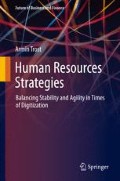Abstract
This chapter deals with the short and medium term acquisition of knowledge and skills. The focus is on vocational training, leadership development, continuous learning and knowledge management. It becomes clear that in a hierarchical, stable context learning is more planned and takes place in a formal framework far away from the reality of work. In agile and networked worlds, it is more likely to be based on self-directed, autonomous approaches that are close to operational reality.
Access this chapter
Tax calculation will be finalised at checkout
Purchases are for personal use only
Notes
- 1.
An example of this is my own introductory lecture “Human Resources Management”, which is available on YouTube in 20 sessions with a total duration of 24 h.
References
Atkins P, Wood R (2002) Self-versus others’ ratings as predictors of assessment center ratings: validation evidence for 360-degree feedback programs. Pers Psychol 55(4):871–904
Baldwin TT, Ford KJ (1988) Transfer of training: a review and directions for future research. Pers Psychol 41:63–105
Bartlett CA (1996) McKinsey & co.: managing knowledge and learning. Harvard Business School, Boston, MA. Case 1996(June):396–357
Ben-Hur S, Jaworski BJ, Gray D (2012) Re-imagining Crotonville: epicenter of GE’s leadership culture. Harv Bus Rev 2:74–82
Bundesinstitut für Berufsbildung (2017) Datenreport zum Berufsbildungsbericht 2017. Informationen und Analysen zur Entwicklung der beruflichen Bildung. Bundesministerium für Bildung und Forschung, Bonn
Castillo NM, Lee J, Zahra FT, Wagner DA (2015) MOOCS for development: trends, challenges, and opportunities. Inf Technol Int Dev 11(2):35–42
Cross J (2006) Informal learning: rediscovering the natural pathways that inspire innovation and performance. John Wiley, San Francisco
Dobischat R, Kühnlein G, Schurgatz R (2012) Ausbildungsreife. Ein umstrittener Begriff beim Übergang Jugendlicher in eine Berufsausbildung. Arbeitspapier 189. Hans-Böckler-Stiftung, Düsseldorf
Garvin DA, Wagonfeld A, Kind L (2013) Google’s project oxygen: do managers matter? Harvard Business School, Boston, MA. Case 313–110, April 2013
Goffee R, Jones G (2006) Why should anyone be led by you? What takes to be an authentic leader. Harvard Business School Press, Boston
Jackson EJ, Schuler RS (2012) Strategic human resource management. Blackwell, Malden
Marquardt MJ, Leonard HS, Freedman AM, Hill CC (2009) Action learning for developing leaders and organizations. American Psychological Association, Washington, DC
McDermott R, Snyder W, Wenger E (2002) Cultivating communities of practice: a guide to managing knowledge. McGraw-Hill, Berkshire
McGregor D (1960) The human side of enterprise. McGraw-Hill, New York
Milton N, Lambe P (2016) The knowledge manager’s handbook: a step-by-step guide to embedding effective knowledge management in your organization. Kogan Page, London
Nonaka I (1994) A dynamic theory of organizational knowledge creation. Organ Sci 5:18–19
Pariser E (2012) The filter bubble: what the Internet is hiding from you. Penguin Books, London
Robbins SP, Judge TA (2016) Organizational behavior. Pearson, New York
Schöllgen G (2002) Diehl. Ein Familienunternehmen in Deutschland 1902–2002. Propyläen, Berlin
Sims C, Johnson HL (2011) The elements of scrum. DyMaxicon, Foster City
Trost A (2011) Personalentwicklung 2.0. In: Trost A, Jenewein T (eds) Personalentwicklung 2.0. Wolters Kluwer, Köln, S 11–28
Trost A (2017) The end of performance appraisal. A practitioners’ guide to alternatives in agile organizations. Springer, Heidelberg
Wehner B, Ritter C, Leist S (2017) Enterprise social networks: a literature review and research agenda. Comput Netw 114:125–142, 26 February
Author information
Authors and Affiliations
Rights and permissions
Copyright information
© 2020 Springer Nature Switzerland AG
About this chapter
Cite this chapter
Trost, A. (2020). Learning and Knowledge. In: Human Resources Strategies. Future of Business and Finance. Springer, Cham. https://doi.org/10.1007/978-3-030-30592-5_7
Download citation
DOI: https://doi.org/10.1007/978-3-030-30592-5_7
Published:
Publisher Name: Springer, Cham
Print ISBN: 978-3-030-30591-8
Online ISBN: 978-3-030-30592-5
eBook Packages: Business and ManagementBusiness and Management (R0)

